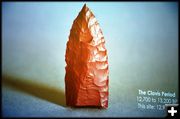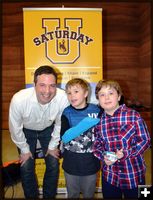

Clovis Point- 12,950 BP
Nearly three inches long. Found during the 2017 field season at the La Prele Mammoth kill site north of Douglas, Wyoming. This is new-found evidence of Ice Age humans nearly 13,000 years ago in what is today Wyoming.
|


Speaker Group
Paul Flesher, Robert Godby, Kristi Hansen, Todd Surovell - special guests from the University of Wyoming
|


Fans of Dr. Surovell
Todd Surovell, Dean and Adrien Messal.
Dr. Surovell is Professor of Archeology; Chair, Department of Anthropology, U of W.
|
|
Saturday University
Water, Money and Mammoths
by Terry Allen
March 4, 2018
An enthusiastic and attentive crowd gathered at the Lovatt Room of the Pinedale Library on Thursday evening, March 1st, to hear three fascinating talks from three engaging professors from the University of Wyoming (UW). Saturday University was sponsored by Sublette BOCES, the Sublette County Library, and UW.
Who Gets to Drink?
Dr. Kristi Hansen, Associate Professor of Agricultural and Applied Economics, University of Wyoming, spoke on the history of Wyoming's water, development of water law, and the future of Wyoming water.
Water is a limited resource in most of the western United States, yet growing populations and environmental demands increase pressure on existing supplies. Who should be allowed to use it when supplies become more scarce? Dr. Hansen described how economists think about water allocation among competing users and different uses, drawing lessons for the drought-stricken Upper Colorado Basin. "Cities are willing and able to pay a lot of money for water," she said. "We have agreements with surrounding states on how much water we have to send downstream."
Income Inequality: Its Effects on the USA’s Economic and Political Future
Dr. Rob Godby, Associate Professor of Economics; Director, Center for Energy Economics & Public Policy, University of Wyoming gave a surprisingly engaging and easy to understand talk on the relationship between our economy and our politics.
"We hear almost daily about our country’s political divide, but the United States faces an even more disruptive division, that of increasing income inequality. As the economic divide has grown over the past two decades, it has enhanced the perception that America is facing a financial crisis as well as a political one." Dr. Godby explained what income inequality is and examined the dynamics that have led to the current situation, as well as providing some hope for the future. "Many economists are starting to believe that income inequality is related to financial instability," he said. "Technology has made it we need less people to do jobs."
Wyoming’s First Humans at an Ice Age Mammoth Kill Site
Dr. Todd Surovell, Professor of Archaeology; Chair, Department of Anthropology, University of Wyoming put us all in a time machine and took us back the age of Mammoths. Fascinating photographs complimented the history he shared.
The first people to live in Wyoming arrived more than 13,000 years ago after crossing a land bridge from Asia to North America and moving southward through the northern glaciers. Upon arrival, these people encountered many types of large mammals which have since disappeared from New World ecosystems. At the La Prele Mammoth site in Converse County, University of Wyoming archaeologists have discovered evidence of human predation of a Columbian mammoth as well as a campsite that can shed light on the social organization of Wyoming’s first residents. "This was a time when there were lions, sabre tooth tigers, dire wolves, camels, multiple horses, and giant beavers the size of black bears living here," Dr. Surovell said.
An additional highlight of the event for this writer was the enthusiasm and thoughtfulness of two young brothers from the audience. Dean Messal age 6-1/2, was interested to know how long the digging at the site had been going on and he wondered if it was possible that the Clovis point Dr. Surovell's team had found could have been used by the native people to kill a mammoth for food. Dr. Surovell agreed that was a very likely possibility. Adrien, age 8, wondered if the archeologists had found any human bones along with the Mammoth bones? Dr. Surovell said that was a very good question that no one had ever asked before. However, he said they had not found any ancient human remains mixed in with the mammoth bones yet.
I heard several people comment on the delicious food that was provided prior to the talks. I had one of the juicy roast beef sandwiches and a big cookie and I have to agree...they were both exceptional.
A special thanks to Dawn Ballou at Pinedale Online who sponsored this story.
Terry Allen: txpartisan@gmail.com
|